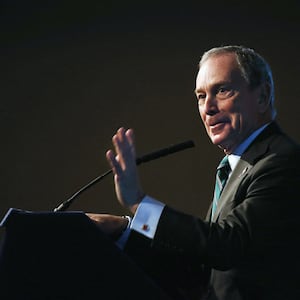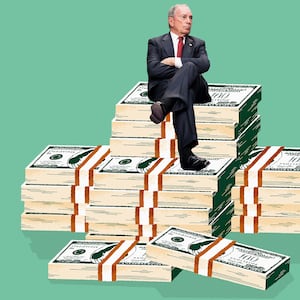Many in the media and political class see Donald Trump as the face of America’s autocratic future. They’ve had less to say about Michael Bloomberg, a far more successful billionaire with the smarts, motivation, and elitist mentality not only to propose but actually carry out his own deeply authoritarian vision should he be elected president.
Bloomberg, who’s quickly moved up in national polls on an unprecedented tsunami of spending and despite sitting out the Democratic debates, represents, in a way never seen in modern American politics, the melding of oligarchal power with political willfulness. His campaign remains a wild long shot, but ask New York City how that can play out—and how difficult it is to dislodge this oligarch once he’s in office, even when the law demands that he leave.
Compared to Bloomberg, Trump’s estimated $3 billion fortune is paltry. Bloomberg is the world’s ninth richest man, with a fortune of nearly $60 billion. The two post-retirement-age party-jumpers share not only flimsy medical excuses for staying out of Vietnam, long histories of locker-room talk, and joint refusals to fully disclose their taxes while running or to step away from their private business interests while serving in public office but, perhaps most fundamentally, a habit of naming things after themselves and a narcissistic sense that common rules don’t apply to them.
Already a modern-day Crassus, Bloomberg has both the wealth and the brains to emerge as a true Caesar, albeit a short-statured and aging one. Just as Caesar used the wealth of Gaul to finance his takeover of the Republic, Bloomberg can use his private fortune to bribe, cajole and otherwise promote his ascendancy. In his 12 years as ruler of New York, he showed his willingness to “buy” elective office, spending half a billion dollars on his three runs. To match the $174 per vote he spent to win his final term, Bloomberg—who’s has already spent $200 million on TV ads—would need to spend an unheard of $12 billion. He could afford it.
None of this seems beyond a man who demonstrated his l’état c’est moi attitude in 2009, when, after reluctantly giving up a run in the 2008 presidential election, he changed city law and overrode the will of the voters to allow himself to run for a third term after personally meeting with the owners of the city’s three major papers to get their editorial boards to reverse themselves and endorse that undemocratic move. Rules, in the Bloombergian universe, only apply to people with less than ten zeros in their net worth. He spent $102 million—not counting off-the-books hush money to keep activist groups quiet, among other things—for a 15-to-one spending advantage as he eked out a narrow win in a city that was so sick and tired of him that it elected corrupt schmendrick Bill de Blasio once Bloomberg’s name was finally off of the ballot.
Bloomberg is a man of undisguised arrogance. As mayor, he already saw himself as a sort of little president, once boasting that “I have my own army in the NYPD, which is the seventh largest army in the world… I have my own State Department, to Foggy Bottom’s annoyance. We have the UN in New York, so we have entree into the diplomatic world that Washington does not have. I don’t listen to Washington very much, which is something they’re not thrilled about.” Should he gain access to the real Army and State Department, he’ll use them as he sees fit, and with little concern for the will of the voters.
Unlike Trump, or some of his leading Democratic rivals, Bloomberg is not playing the populist card but seeking to bury “the great revolt” that has overturned elite control of the country. A fierce defender of Wall Street, Silicon Valley and the corporate elite, he is hoping, as a recent editorial in Bloomberg Opinion suggested, that “populism will probably just fade away” so that the ruling class can again “relax.”
The plutocracy would relax with Bloomberg in a way they have not with the erratic Trump. Most of those in the big corporate suite, according to a recent poll in Chief Executive magazine, would prefer to see the president impeached and out of office. Bloomberg is a friend to many owners of mainstream media properties, and an owner of those properties himself, as we were reminded when Bloomberg News announced it would no longer aggressively cover his Democratic rivals, though Trump would remain fair game, an absurd standard that poured news on the fire of Trump’s attacks on “fake news.” The executive staff of Bloomberg Opinion, meantime, left their positions to join his campaign.
What would a Bloomberg regime look like? In contrast with Trump, Sanders or Warren, Bloomberg is offering the politics of the gentry liberals who have dominated the party’s big-dollar fundraising in recent decades.
This typically means strong support for combating climate change, advocating ever more mass immigration, free trade and banning guns—all positions that don’t cost the plutocracy money.
Bloomberg’s big idea, if you want to call it that, is that rather than buy a candidate, he can be the candidate.
Even his aggressively “progressive” stances, for example on climate, would likely benefit the plutocracy. His calls to have 80 percent of America’s electricity, up from 17 percent today, come from renewables this decade, is a blatantly unrealistic gambit that sounds good in a campaign ad. More important, it offers a golden opportunity for Wall Street to make windfall profits while imposing higher prices on ordinary rate payers.
The problem Bloomberg needs to solve lies in being a billionaire oligarch running in a Democratic Party that’s moved father to the left, as Sanders and others have found ways to create a “party of the people” that can raise enough money to reject the policies preferred by Wall Street, Silicon Valley and the rest of the globalized ruling class. As Sanders aptly put it when Bloomberg announced his intentions: “The billionaire class is scared and they should be scared.”
Resentment of Sanders’ detested “billionaire class” is widespread and well-deserved. Over the past few decades they have consolidated both financial and corporate assets into few hands. Public support for large corporations, including key industries controlled by the oligarchs—banking, media and tech—are all near historic lows. Corporate consolidation also has been linked to ever greater inequality and a diminishing of the middle class. Despite a strong economy, roughly half of Americans, according to Gallup, have negative views of large corporations, while nearly 90 percent favor small business.
The Trump-opposed billionaire class had hoped to align behind former Vice President Biden but as his campaign has struggled they fear that the 2020 race could be gentry liberalism’s Stalingrad. Bloomberg hopes that his money can liberate him from political gravity; that while other candidates are putting scarce resources into a handful of states ahead of their caucuses and primaries that he can afford to spend nationwide, and, if none of his rivals breaks all the way through, put himself in a position to be the powerbroker at a brokered convention. That’s a long-shot bet, but he’s bet big against the odds before and won.
As mayor of New York, Bloomberg’s approach—in addition to building on Rudy Giuliani’s law-and-order regime—was to shape the city as “a luxury product” shaped by the interests and investments of his fellow billionaires. Under his watch, the city moved to the tune of oligarchy, constructing ever more expensive apartment structures, often encouraged by heavily discounted property taxes and with lots of breaks for new lavish new corporate offices.
In contrast, the city’s middle-class neighborhoods shrank, most precipitously in Manhattan, while those of the rich and poor grew. The city’s inequality burgeoned, ranking among the most pronounced in the country now. The very feel of the city changed as long-standing neighborhood retail fell from soaring rents, with once cherished outlets either replaced by chains, “pop-ups” or simply abandoned, a form of “high rent blight.” Gone increasingly are both the historic neighborhoods and blue-collar commerce areas—the food, fish, flower, and other markets—that had been part of the city’s economic culture for centuries.
In the process, he steadily weakened the city’s once diverse, if chaotic character into plutocratic-driven monoculture. His disinterest in the will of the voters, as captured in his jihad against sugar and his insistence of ever more stop and frisk policing even as popular opposition to it grew along with its overuse, was in many ways policy made possible by the power implicit in his wealth, a function of his fortune.
Another mayor with such an agenda would have faced major opposition. But as Sol Stern and Fred Siegel wrote in 2011, "the most discomfiting aspect of the Bloomberg mayoralty” was his ability to curb criticism by handing out what Ben Smith of BuzzFeed called ”protection money” to the city’s many nonprofits, activist groups, religious and community associations. Bloomberg even cleverly uses his largesse to win over journalists, offering hugely remunerative salaries to those willing to follow his party line.
In the end, however, the Bloomberg legacy proved unable to survive Midas’ reign. Without his checkbook to smooth conflicts, the city has devolved under his leftist successor, the scandal-prone Bill de Blasio, who ran on an anti-Bloomberg “tale of two cities” platform.
If there’s a good parallel to Bloomberg it would be Silvio Berlusconi, the media magnate who served, somewhat disastrously, as Italy’s prime minister between 1994 and 2011. Like Bloomberg, Berlusconi, long his neighbor in Bermuda, used his own media to promote his political ascendancy. Bloomberg has a similarly impressive media empire including the former Business Week, Bloomberg News, Bloomberg View (formerly Bloomberg Opinion), and Bloomberg TV. He has also reportedly expressed interest at times in purchasing the Financial Times, The New York Times, and The Wall Street Journal.
While the media, including Bloomberg’s own mouthpiece, has compared Trump to Berlusconi, holding up a mirror might be more accurate. With his existing web of information providers, Bloomberg, like Berlusconi, has some power to create his own political reality. Bloomberg’s touch may be lighter, but the Bloomberg-controlled media tends to follow the “boss’s” party line; as a long-time writer for the magazine now called Bloomberg BusinessWeek told me, “we’re not even allowed to use the word ‘oligarch’” in their articles. One would have to wonder how thrilled progressives would be if, for example, an American-born Rupert Murdoch announced a White House bid.
A Bloomberg presidency would be very different from this one. Trump is annoying but has scaled back the power of the administrative state. Bloomberg would likely seek to expand federal power to dictate the minutiae of everyday life in terms of diet, how we use energy, the kind of houses we live in and how we get to work.
And for all of Trump’s conflicts as the chief executive of both the United States of America and the Trump Organization, his businesses have little influence on anything beyond some slivers of the real-estate market.
Yes, Trump roars like an authoritarian, and admires those with power—but that’s a trait he shares with Bloomberg, who recently made the preposterous claim that China’s Xi Jinping is “not a dictator.” He portrays the communist regime, noted New York magazine as “ecologically friendly, democratically accountable, and invulnerable to the threat of revolution.” Of course, this is the same Bloomberg whose news operation gave up on reporting on corruption in China when that reporting started damaging the terminal sales that made his fortune.
If Bloomberg somehow manages to buy this election, we would not see a repeat of the haphazard and sometimes nonetheless effective Trump presidency, but rather a softer version of Xi’s rule here in America— dictatorial, intolerant of dissent, controlling, and friendly to the oligarchy so long as it produces economic growth. Having made themselves hysterical about our current tin-pot petty authoritarian president, progressive Americans could look forward to experiencing the real thing under the all-knowing guise of Michael Bloomberg.









